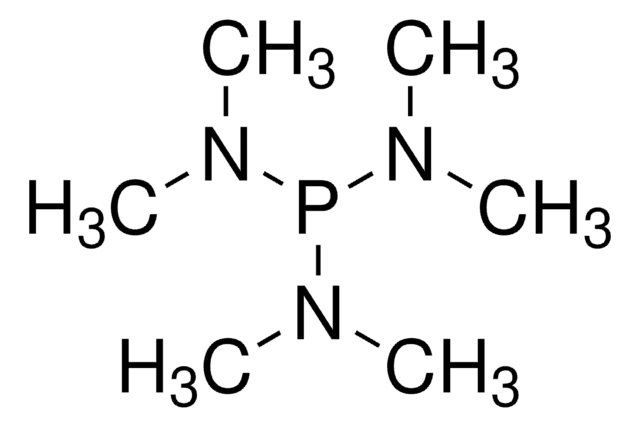333670
Tris(trimethylsilyl)phosphine
95%
Synonym(s):
(P(TMS)3), Tris(trimethylsilyl)phosphane
About This Item
Recommended Products
Quality Level
Assay
95%
form
liquid
reaction suitability
reaction type: Buchwald-Hartwig Cross Coupling Reaction
reaction type: Heck Reaction
reaction type: Hiyama Coupling
reaction type: Negishi Coupling
reaction type: Sonogashira Coupling
reaction type: Stille Coupling
reaction type: Suzuki-Miyaura Coupling
reagent type: ligand
refractive index
n20/D 1.502 (lit.)
bp
243-244 °C (lit.)
density
0.863 g/mL at 25 °C (lit.)
functional group
phosphine
storage temp.
2-8°C
SMILES string
C[Si](C)(C)P([Si](C)(C)C)[Si](C)(C)C
InChI
1S/C9H27PSi3/c1-11(2,3)10(12(4,5)6)13(7,8)9/h1-9H3
InChI key
OUMZKMRZMVDEOF-UHFFFAOYSA-N
Looking for similar products? Visit Product Comparison Guide
Application
- Indium phosphide (InP) and indium gallium phosphide (InGaP) nanocrystals, type III-V semiconductors.
- Chiral TMS-phospholane which can be further used to synthesize various bisphospholane ligands for asymmetric catalysis.
Signal Word
Danger
Hazard Statements
Precautionary Statements
Hazard Classifications
Eye Irrit. 2 - Pyr. Liq. 1 - Skin Irrit. 2 - STOT SE 3 - Water-react 2
Target Organs
Respiratory system
Storage Class Code
4.2 - Pyrophoric and self-heating hazardous materials
WGK
WGK 3
Flash Point(F)
Not applicable
Flash Point(C)
Not applicable
Personal Protective Equipment
Choose from one of the most recent versions:
Already Own This Product?
Find documentation for the products that you have recently purchased in the Document Library.
Customers Also Viewed
Articles
Solvothermal synthesis of nanoparticles: applications from nanocircuits and nano-optical circuits to nanomagnetics and biotech.
Solvothermal synthesis of nanoparticles: applications from nanocircuits and nano-optical circuits to nanomagnetics and biotech.
Solvothermal synthesis of nanoparticles: applications from nanocircuits and nano-optical circuits to nanomagnetics and biotech.
Solvothermal synthesis of nanoparticles: applications from nanocircuits and nano-optical circuits to nanomagnetics and biotech.
Our team of scientists has experience in all areas of research including Life Science, Material Science, Chemical Synthesis, Chromatography, Analytical and many others.
Contact Technical Service











